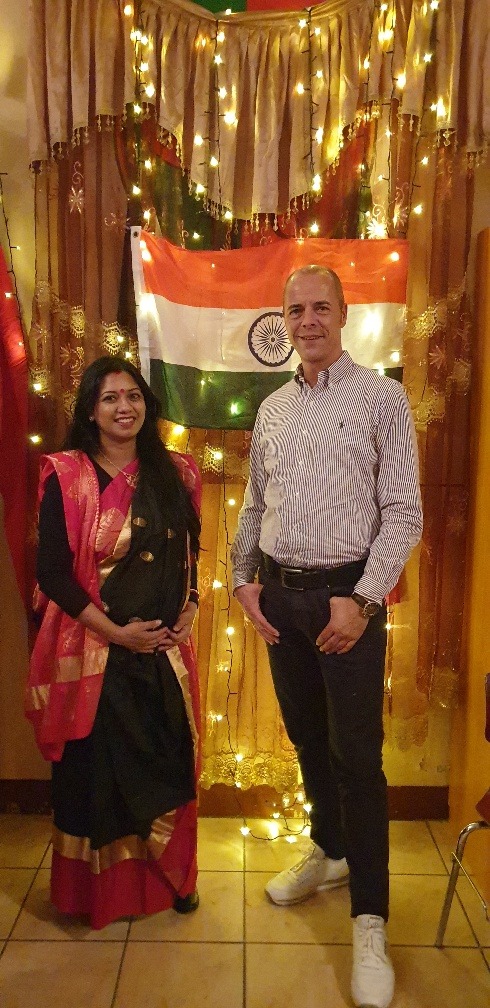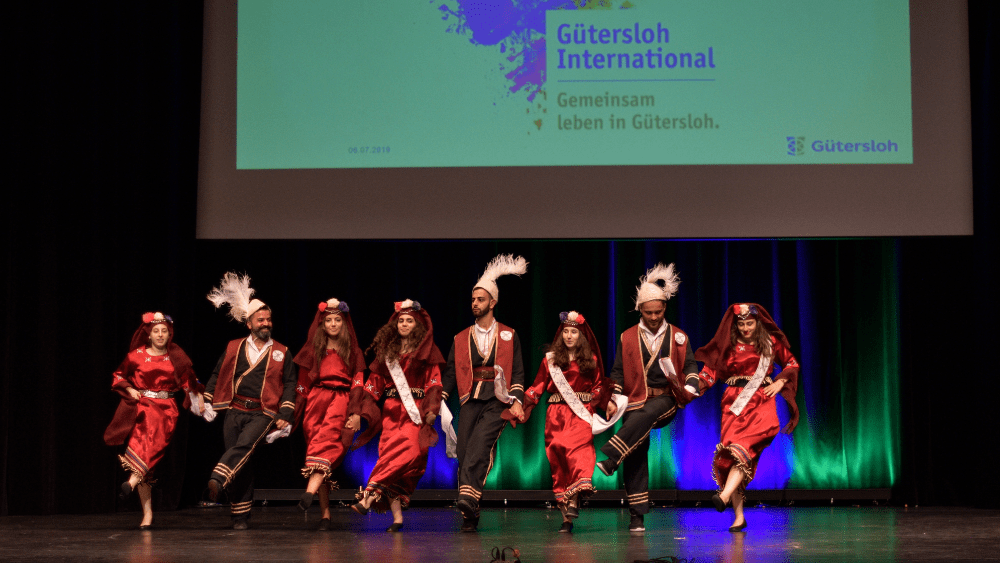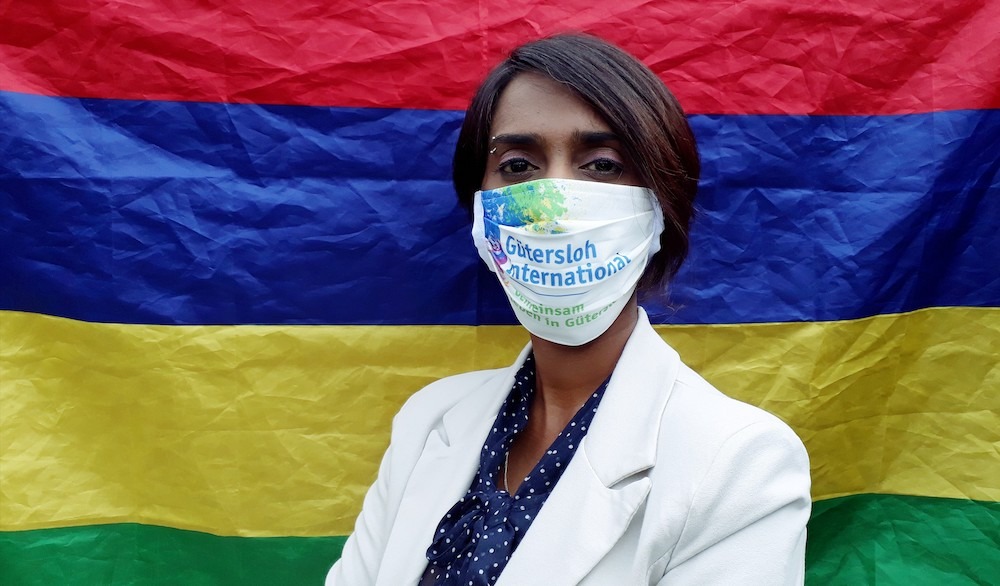Gütersloh, an industrial city in Western Germany’s North Rhine-Westphalia state, is one of 35 communities that participated in Weltoffene Kommune, a national initiative run by Bertelsmann Stiftung and PHINEO, partners in the Welcoming International Alliance.
The city’s 100,000 inhabitants represent 127 nationalities, and about half have a recent migration background. Mayuri Schindler, chair of the Integration Council of Gütersloh (Integrationsrat), and Frank Mertens, an integration commissioner at the Gütersloh Municipality (Integrationsbeauftragter Stadt Gütersloh), share insights about local inclusion work, drawing on the community’s history of welcoming and current efforts to mobilize local stakeholders around inclusion.
Q: What does your welcoming work look like in Gütersloh? What is the make-up of the newcomer population?
Mayuri Schindler (MS): A significant proportion of newcomers are people who came to work here, and many were joined by their partners and children. We’re here to support them in becoming part of the local society. We want them to feel at home, and also be comfortable building their own communities.
Frank Mertens (FM): Many of Gütersloh’s new arrivals come from Central Eastern Europe, including 3,000 Romanians and 2,200 Polish people. Approximately 800 people arrived from Ukraine over the course of just a few weeks between February and May 2022. We don’t yet know how many people are planning to stay in the area or how many are visiting temporarily. Understanding newcomers’ motivations and future plans is an urgent task so we can plan infrastructure such as the location and capacities of kindergartens and schools.
Photo caption: Frank Mertens & Mayuri Schindler stand together during the Gütersloh Diwali celebration held at the Portuguese Association’s Club. Credit: Frank Mertens

Q: What is the history of inclusion processes in Gütersloh?
FM: The Second World War devastated our region, so when migrants arrived here from Turkey, Greece, the former Yugoslavia, Portugal, Spain, and Italy, local authorities welcomed them enthusiastically. The message from the municipality was that we needed to support newcomers, because they came to work and help rebuild. The municipality communicated that “we don’t just want to live beside each other, but with one another.”
For almost 50 years we have run a newcomer consultation service (Beratungsstelle für Migrantinnen und Migranten), offering support such as translation of official letters, and interpreters for families at school or kindergarten. Gütersloh recognized the value of migration long ago, and invested in support services. This attitude became part of our DNA.
Q: Who is part of your team?
MS: The municipality has an integration commissioner, newcomer consultation services staff, and an Integration Council. The Integration Council consists of 10 publicly elected members, plus one representative from each of the current political parties.
I see our work as informal political work. I don’t have a German passport but I’m able to sit on the Integration Council. All elected members have migration experience. We are funded by the municipality, and our projects are supported by the integration commissioner and the administration department. We collaborate with 64 community groups, associations, and cultural clubs founded by newcomers.
FM: We used to have politically appointed candidates, but I decided to change this when I became the Integration Commissioner because I want the Integration Council to be an independent body. Since making this change, we have seen more active civic participation among migrant residents. In recent years, residents from migrant communities have voted for Integration Council members during local elections. They receive invitations to vote by mail. EU residents can also vote in local elections.
Q: What support does the Integration Council offer to migrant and newcomer communities?
MS: We work not only for migrant and newcomer groups but also with them, whether they are recent arrivals or migrated 50 or 60 years ago, or if they were born here but their families have an international history. We identify challenges together, and develop processes that address barriers to civic participation.
For the past two years, we have held informal monthly community roundtable meetings (Treffen am runden Tish). We usually organize meetings in a restaurant so people can order food or a drink and feel relaxed. Of course, during the pandemic we had to move meetings online.
We aim for a mix of residents and representatives from migrant organizations to create new pathways for collaboration. Some participants come with specific questions, such as “Where do I find a doctor?” or “Where can I buy food from my home country?” We use the occasion to connect them with local guides. Some members of longstanding communities come to connect because they are curious about different cultures.
Q: Are there other projects or events you would like to mention?
FM: Gütersloh International Day takes place every summer in front of city hall (Stadthalle), connecting cultures through food, dance, and singing. It’s been a very popular festival for over 40 years. Most of the local cultural associations participate, and we have over 40 food stalls from various countries including Portugal, Italy, Thailand, Afghanistan, Syria, India, and Germany.

Dancers at the Gütersloh International Cultural Festival. Photo credit: Diana Didilica
MS: We hold an International Women’s Day Breakfast in March. More than 120 women from different communities gather, along with the mayor and the Immigration Commissioner. We also have the Cultural Community College (Volkshochschule), where people can connect and learn different languages. The Cooking in a Foreign Pot (In fremde Töpfe schauen) project is popular, where newcomers prepare food from another country in small groups, share stories, and learn about different cultures.
Q: How do you build relationships between long-standing and newcomer communities?
FM: We are part of a network which includes many migrant-led organizations. We invite network members to our meetings and share information about local opportunities. The migrant communities know that I’m available as a representative of the municipality, and that Mayuri and her team can be contacted with specific needs or problems.
For example, at one of our recent meetings, a representative informed us that no one was reachable in our Pension Office (Rentenberatungsstelle), so people were unable to navigate the complex pension system. As a result we accompanied him to the office to investigate the problem. We also reported on the issue at the next council meeting.
We usually hold Integration Council meetings at city hall, but we also recognize the need to meet communities where they are. We have held meetings at a conference organized by the Afghan community, and at the Portuguese and Turkish community centers. It shifts the dynamic — away from participants being “talked at” by the Council, towards a mutual conversation.
MS: You have to invest in interpersonal connections. We support collaboration between various communities to create shared experiences and narratives. For example, when COVID-19 prevented members of the Indian community from traveling to India to celebrate Diwali (Festival of Light), they decided to organize celebrations here — but didn’t have access to event space. They approached the Portuguese Association, which offered their space for use.
Q: How do you disseminate information about your events and projects?
MS: We announce roundtable meetings in a local newspaper, via social media, and through our partner network, but we also benefit from word of mouth. The size of the city is an advantage, as it’s easier to connect in a smaller place.
We intentionally use plain language in the messages that we send in German, so they can be easily understood by local language learners. Some communications, such as public health messages about COVID-19, are produced in multiple languages.
But emails and leaflets are not enough when it comes to making people feel at home. The message we send as a municipality, and as the Integration Council, is that we need to live and work together, transcending national identities.

Zarina Drescher wears a coronavirus mask that the municipality of Gütersloh created to protect from the virus in the first year of the pandemic and shows the logo of their annual cultural event “Gütersloh International”. Credit: Zarina Drescher
Q: Can you think of any collaborations with migrant communities that you found particularly valuable?
FM: During the pandemic we communicated with religious leaders from local mosques, along with Syrian Orthodox and Greek Orthodox churches, about COVID-19 restrictions. We have long-term relationships with these communities, so they trusted and followed our advice. This was not necessarily the case in other German cities, where the municipality had to close places of worship because they did not follow guidelines.
MS: Some of our Gütersloh communities — both migrant and non-migrant — were not well-informed about the advantages of COVID-19 vaccinations. We decided to hold an International Vaccine Day. We promoted the event in multiple ways, such as word of mouth, leaflets, mailing lists, social media, and newspapers. About 250 people got vaccinated in a specially designated bus outside city hall. They were welcomed by a Portuguese and Romanian food stand. The vaccine bus also traveled to community spaces, such as Islamic Centers and the Romanian Center.

International Vaccine Day in Gütersloh. Credit: Stadt Gütersloh
FM: We know that small gestures can have a huge impact. Several years ago, there was a tragic attack on a mosque in New Zealand. After hearing the news, I immediately visited all three mosques in Gütersloh, meeting with Imams to offer condolences on behalf of the municipality, and to assure them that they will always have our support. It was important to show the human face of the municipality — immediately, and outside of regular working hours — and that the Muslim community is part of Gütersloh.
Q: How do Bertelsmann Stiftung and PHINEO support your work?
FM: Gütersloh participated in the Weltoffene Kommune program conducted by Bertelsmann Stiftung and PHINEO. We completed a “Self-Check” process, using Weltoffene Kommune’s standard to evaluate our inclusion work, not only from the municipality’s internal perspective, but also through a collective process that involved various stakeholders, including migrant-led organizations.
Bertelsmann Stiftung and PHINEO supported us with facilitation, documentation, and evaluation. We identified areas to improve, and then received technical assistance to further develop our integration work.
Q: What has changed in Gütersloh because of your relationship with Weltoffene Kommune?
MS: Our welcoming work has gained more visibility due to a new social media strategy and dedicated webpage for the Integration Council. With more public awareness of the concept of integration, we receive more interest in joining the Integration Council. Last year, we had 58 candidates for 10 positions, while five years ago, we had 12 candidates for the same number of positions. People see integration as a collective effort.
Personally, as someone who arrived in Gütersloh from India, I now feel very comfortable in this city. I also see more international faces here today.
